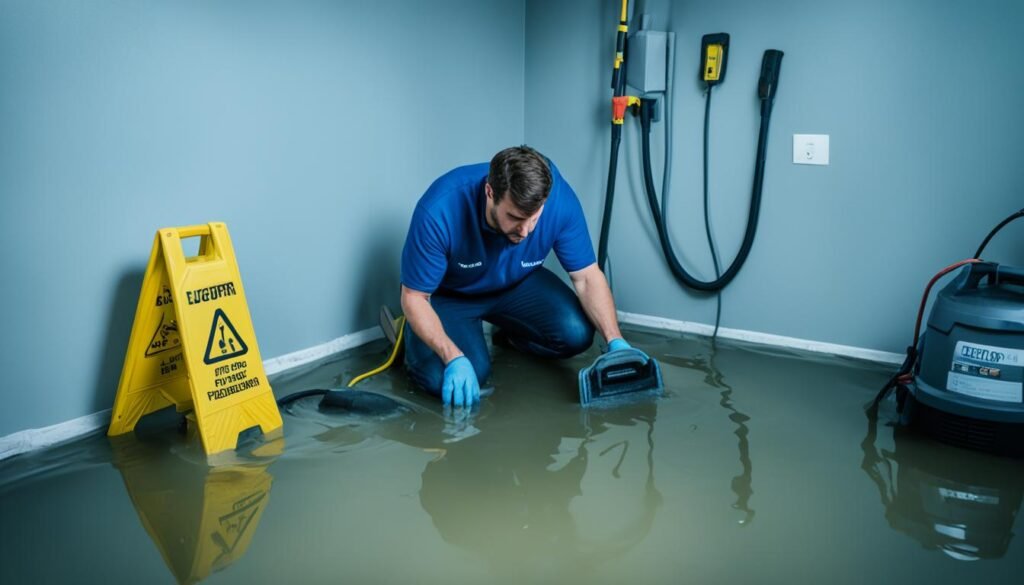Two-thirds (66.6%) of water damage comes from burst pipes, not floods. This eye-opening fact shows knowing what to do and not do is key after water damage. The right steps are needed to restore your property after a water emergency. This includes removing water, cleaning, and repairing the structure.
When water damage hits, avoiding mistakes can make the recovery smoother and safer. Learning what not to do is as critical as knowing what to do after a water incident. This knowledge can help your property make a full recovery.
Key Takeaways
- Avoid attempting water damage cleanup or restoration without professional help to prevent additional problems and safety risks.
- Do not use electronics or attempt to fix soggy ceilings on your own, as these tasks require specialized skills and equipment.
- Refrain from leaving wet items together or immediately redecorating, as these actions can exacerbate existing damage.
- Steer clear of cleaning up contaminated water, such as Category 3 floodwater, without proper personal protective equipment and decontamination procedures.
- Do not neglect to address water damage promptly, as waiting too long can significantly increase costs and prolong the recovery process.
Crucial Actions to Avoid After Water Damage
After water damage, it’s vital to prevent further harm. Don’t use water pumps or fans on wet areas to avoid electrical dangers. Also, be careful with outlets that water might have reached. It’s wise not to use any electrical tools until you’re sure it’s safe.
In cases of extreme water, like from floods or sewer issues, don’t clean it yourself. This kind of water can be very harmful, making it smart to wait for professional cleaning. This will protect you from serious health risks.
Avoiding Electrical Hazards
Water and electricity don’t mix well. It’s key to avoid using electric devices where the water has been. This could save you from dangerous accidents. Always have an electrician check your place first to make sure it’s safe before using any electrics.
Handling Contaminated Water Safely
If the water is contaminated, stay away from it. This water might have harmful things in it like bacteria. It’s best to let the pros deal with it using the right gear and methods. They know how to stay safe while cleaning up.

“Immediate response to water damage is crucial as delays can lead to significant consequences.”
Taking the right steps and getting expert help is key. This keeps you safe and reduces water damage’s impact on your home. Always prioritize safety first.
What to Avoid After Water Damage
If your home has suffered water damage, there are key actions to dodge. Not taking these steps can create more issues, lengthen the repair process, and possibly cause harm.
Mold is a major worry. Things like clothes, books, and magazines are perfect for mold to grow if they stay wet. You should quickly dry items like these. The longer they stay wet, the more mold can spread in your home.
Make sure wet things don’t sit on the floor. Keeping them elevated lets air circulate around them, aiding in their drying. If left on the floor, moisture can sneak into your walls or floors, causing more harm.
- Separate wet fabric and paper items for drying to prevent mold growth
- Prop up damp items off the floor to improve airflow and drying
Handling the damage alone can backfire. Painting wet walls or fixing damp ceilings without the right knowledge might make things worse. It’s smarter to leave it to those who specialize in water damage repair.
Waiting too long to fix things is also risky. Not dealing with the water fast can cause mold. This can be bad for your health and cost more to repair later. Quick action is key to limiting damage and costs.
| Mistake to Avoid | Consequence |
|---|---|
| Leaving wet fabric and paper items together | Mold growth and spread |
| Failing to prop up damp items off the floor | Prolonged moisture damage and structural issues |
| Attempting DIY repairs on wet walls or ceilings | Further structural damage and safety hazards |
| Delaying professional water damage restoration | Increased costs, mold growth, and extended recovery time |
Avoiding these errors and dealing with water damage quickly is vital. This limits the effect on your place. Remember, quick action and professional help are very important for a fast recovery.

Conclusion
When dealing with water damage, quick action is essential. Water Damage Pros – San Bernardino can offer the assistance you need. Each water damage situation is different. They are experts in all types of damage, including clean, gray, and dangerous black water. They will safely guide you through the process.
Trying to clean up water damage by yourself is risky. It might also lead to costly mistakes. It’s best to bring in the professionals at Water Damage Pros. They ensure the work is done correctly, stopping further harm. Their services range from drying and mold prevention to structural and electrical repairs.
Delaying dealing with water damage is a bad idea. Reach out to Water Damage Pros – San Bernardino at 951-903-5429 immediately. Their quick, reliable service will restore your property. This ensures your safety and lessens the damage to your investment. Remember, early action leads to a better result.
FAQ
What should I avoid doing when dealing with water damage in my home or business?
What should I do if the water inside my building is a result of flooding or a sewage backup?
How should I handle wet fabric and paper items after a water damage incident?
What should I avoid when it comes to repairing water damage on my own?
Source Links
- https://restoration1.com/blog/heres-what-not-to-do-after-water-damage-in-your-property/
- https://www.forbes.com/home-improvement/home-emergencies/steps-after-water-damage/
- https://www.familyhandyman.com/list/12-tips-for-water-damage-repair/
- https://www.aoacleaningandrestoration.com/blog/immediate-steps-to-take-after-water-damage-what-should-i-do/
- https://advantaclean.com/services/water-damage/water-damage-mitigation/
- https://pureoneservices.com/common-mistakes-to-avoid-during-water-damage-restoration/
- https://crystalrestorationservices.com/water-damage-dos-and-donts-ct/
- https://www.houselogic.com/finances-taxes/home-insurance/water-damage-home-repair/
- https://agents.floodsmart.gov/articles/five-facts-to-help-new-homeowners-protect-against-water-damage
- https://stoneclaims.com/most-common-water-damage-cleanup-mistakes-to-avoid
- https://www.gotamesscalldrs.com/water-damage-aftermath-what-gets-ruined
- https://restorationxperts.net/water-damage-cleanup-expert-tips-for-a-safe-effective-process


